TNPSC Group 2/2A Model & Previous Year Question Papers PDF Download
TNPSC Group 2/2A is the Tamilnadu Government Job recruitment exams for the post of Commercial Tax Officer, Probation officer, Employment Officer, Assistant Inspector of Labour, Municipal Commissioner, Assistant Section Officer and many more. Many TNPSC Aspirants aim to get the Jobs in Group 2/2A as these Jobs are the high-level grade and most of the top posts are officer level cadre.
TNPSC Group 2/2A Exams Model Question Papers & Previous Year Papers in English & Tamil:-
One of the important Parts of TNPSC or any Exams preparation is Analysing the Model Question Paper & also look into the previous question papers of TNPSC Group 2/2A. It is vital and must do the job to crack any exams. Analyzing previous year papers and answering it will improve your basic knowledge about the exam and make you get to know about how to read and What to read.
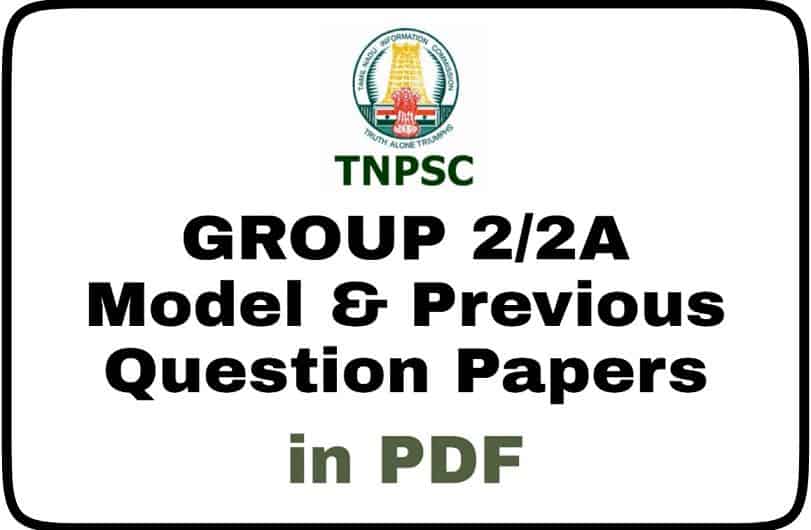
Syllabus Of Group 2/2A for Prelims:-
UNIT-I: GENERAL SCIENCE
(i) Scientific Knowledge and Scientific temper – Power of Reasoning
Rote Learning Vs Conceptual Learning – Science as a tool to understand the past, present, and future.
(ii) Nature of Universe – General Scientific Laws – Mechanics – Properties of Matter, Force, Motion, and Energy – Everyday application of the basic principles of Mechanics, Electricity and Magnetism, Light, Sound, Heat, Nuclear Physics, Laser, Electronics and Communications.
(iii) Elements and Compounds, Acids, Bases, Salts, Petroleum Products, Fertilizers, Pesticides.
(iv) Main concepts of Life Science, Classification of Living Organisms,
Evolution, Genetics, Physiology, Nutrition, Health, and Hygiene, Human diseases.
(v) Environment and Ecology.
UNIT-II: CURRENT EVENTS
(i) History – Latest diary of events – National symbols – Profile of States – Eminent personalities and places in the news – Sports – Books and authors.
(ii) Polity – Political parties and political system in India – Public awareness and General administration – Welfare oriented Government schemes and their utility, Problems in Public Delivery System.
(iii) Geography – Geographical landmarks.
(iv) Economics – Current socio-economic issues.
(v) Science – Latest inventions in Science and Technology.
UNIT- III: GEOGRAPHY OF INDIA
(i) Location – Physical features – Monsoon, rainfall, weather and climate -Water resources – Rivers in India – Soil, minerals, and natural resources -Forest and wildlife – Agricultural pattern.
(ii) Transport – Communication.
(iii) Social geography – Population density and distribution – Racial, linguistic groups, and major tribes.
(iv) Natural calamity – Disaster Management – Environmental pollution: Reasons and preventive measures – Climate change – Green energy.
UNIT – IV: HISTORY AND CULTURE OF INDIA
(i) Indus valley civilization – Guptas, Delhi Sultans, Mughals, and Marathas – Age of Vijayanagaram and Bahmani Kingdoms – South Indian history.
(ii) Change and Continuity in the Socio-Cultural History of India.
(iii) Characteristics of Indian culture, Unity in diversity – Race, language, custom.
(iv) India as a Secular State, Social Harmony.
UNIT-V: INDIAN POLITY
(i) Constitution of India – Preamble to the Constitution – Salient features of the Constitution – Union, State, and Union Territory.
(ii) Citizenship, Fundamental Rights, Fundamental Duties, Directive
Principles of State Policy.
(iii) Union Executive, Union legislature – State Executive, State Legislature – Local governments, Panchayat Raj.
(iv) Spirit of Federalism: center-state Relationships.
(v) Election – Judiciary in India – Rule of law.
(vi) Corruption in public life – Anti-corruption measures – Lokpal and Lokayukta – Right to Information – Empowerment of women – Consumer protection forums, Human rights charter.
UNIT-VI: INDIAN ECONOMY
(i) Nature of Indian economy – Five-year plan models – an assessment – Planning Commission and Niti Ayog.
(ii) Sources of revenue – Reserve Bank of India – Fiscal Policy and Monetary Policy – Finance Commission – Resource sharing between Union and State Governments – Goods and Services Tax.
(iii) Structure of Indian Economy and Employment Generation, Land reforms and Agriculture – Application of Science and Technology
in agriculture – Industrial growth – Rural welfare oriented programs – Social problems – Population, education, health, employment, poverty.
UNIT-VII: INDIAN NATIONAL MOVEMENT
(i) National renaissance – Early uprising against British rule – Indian National Congress – Emergence of leaders – B.R.Ambedkar, Bhagat Singh, Bharathiar, V.O.Chidambaranar, Jawaharlal Nehru, Kamarajar, Mahatma Gandhi, Maulana Abul Kalam Azad, Thanthai Periyar, Rajaji, Subash Chandra Bose, and others.
(ii) Different modes of Agitation: Growth of Satyagraha and Militant movements.
(iii) Communalism and partition.
UNIT- VIII: History, Culture, Heritage, and Socio-Political Movements in Tamil Nadu
(i) History of Tamil Society, related Archaeological discoveries, Tamil Literature from Sangam age till contemporary times.
(ii) Thirukkural : (a) Significance as a Secular literature
(b) Relevance to Everyday Life
(c) Impact of Thirukkural on Humanity
(d) Thirukkural and Universal Values – Equality,
Humanism, etc
(e) Relevance to Socio – Politico-Economic affairs
(f ) Philosophical content in Thirukkural
(iii) Role of Tamil Nadu in freedom struggle – Early agitations
against British Rule – Role of women in the freedom struggle.
(iv) Evolution of 19th and 20th Century Socio-Political movements
in Tamil Nadu – Justice Party, Growth of Rationalism – Self Respect Movement, Dravidian movement and Principles underlying both these movements, Contributions of Thanthai Periyar and Perarignar Anna.
UNIT – IX: Development Administration in Tamil Nadu
(i) Human Development Indicators in Tamil Nadu and a comparative assessment across the Country – Impact of Social Reform movements in the Socio-Economic Development of Tamil Nadu.
(ii) Political parties and Welfare schemes for various sections of people – Rationale behind Reservation Policy and access to Social Resources -Economic trends in Tamil Nadu – Role and impact of social welfare schemes in the Socio-economic development of Tamil Nadu.
(iii) Social Justice and Social Harmony as the Cornerstones of Socio-Economic Development.
(iv) Education and Health systems in Tamil Nadu.
(v) Geography of Tamil Nadu and its impact on Economic growth.
(vi) Achievements of Tamil Nadu in various fields.
(vii) e-governance in Tamil Nadu.
UNIT-X: APTITUDE AND MENTAL ABILITY
(i) Simplification – Percentage – Highest Common Factor (HCF) – Lowest Common Multiple (LCM).
(ii) Ratio and Proportion.
(iii) Simple interest – Compound interest – Area – Volume – Time and Work.
(iv) Logical Reasoning – Puzzles-Dice – Visual Reasoning – Alphanumeric Reasoning – Number Series.
Download Model Question Papers & Previous Year Question Paper below:
Model Question Paper for TNPSC Group 2/2A for revised syllabus pertaining
to the recruitment to the posts included in Combined Civil Services
Examination – II / II A (Group – II/IIA Services).So, TNPSC Group 2/2A 2020 Questions will follow the above Syllabus for Prelims.
| CCSE 2 Model Question Paper(New Syllabus) | Click Here |
| CCSE 2/2A Model Question with Answers | Click Here |
| TNPSC GROUP-II previous years Original Question Papers with Explanatory Answers(2007-2017) | Click Here |
| Group 2 Mains Question Paper 2016 | Click Here |
MUST-READ: TNPSC Group 1 Preliminary Exam General Studies and Original Question Papers with Answers Exam Books
Useful Books for Competitive Exams
Best Books for Competitive Exams [PDF]
Disclaimer: Pavithran.Net doesn’t aim to promote or condone piracy in any way. We do not own any of these books. We neither create nor scan this Book. The Images, Books & other Contents are copyrighted to their respective owners. We are providing PDFs of Books that are already available on the Internet, Websites, and Social Media like Facebook, Telegram, Whatsapp, etc. We highly encourage visitors to Buy the Original content from their Official Sites. If any way it violates the law or if anybody has Copyright issues/ having discrepancies over this post, Please Take our Contact Us page to get in touch with us. We will reply as soon as we receive your Mails.
We Need Your Support. Please Share the Link if it is helpful to your Cherished circle

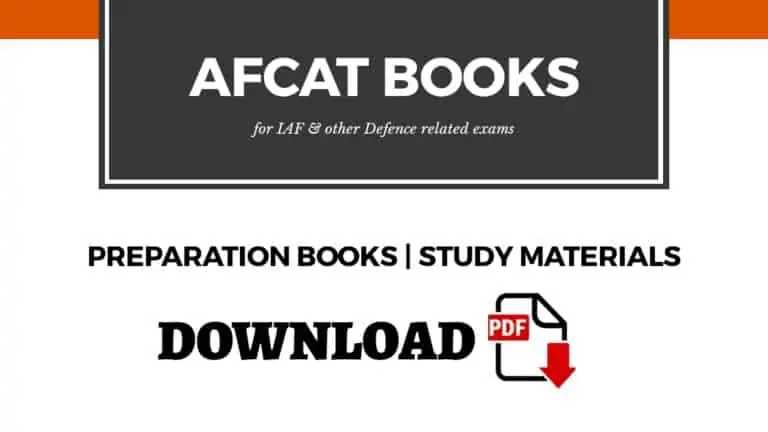
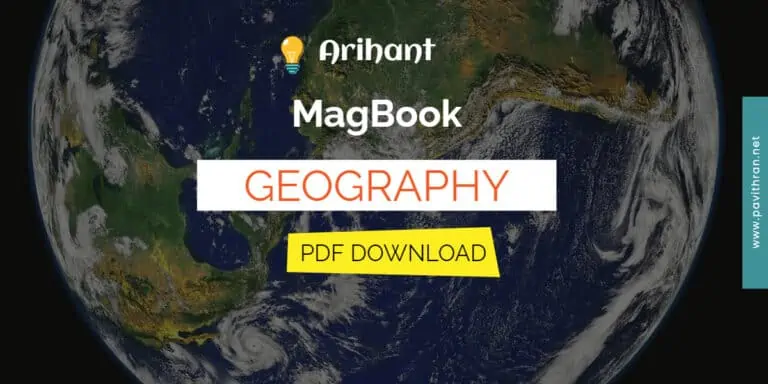
![Kiran NCERT Compendium One Liner Approach [Set of 4 Books] PDF](https://www.pavithran.net/wp-content/uploads/2023/08/photo_2023-08-28_20-52-07-768x1024.webp)
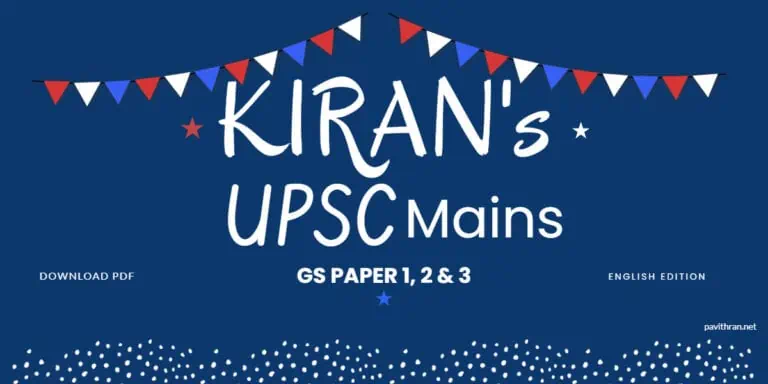
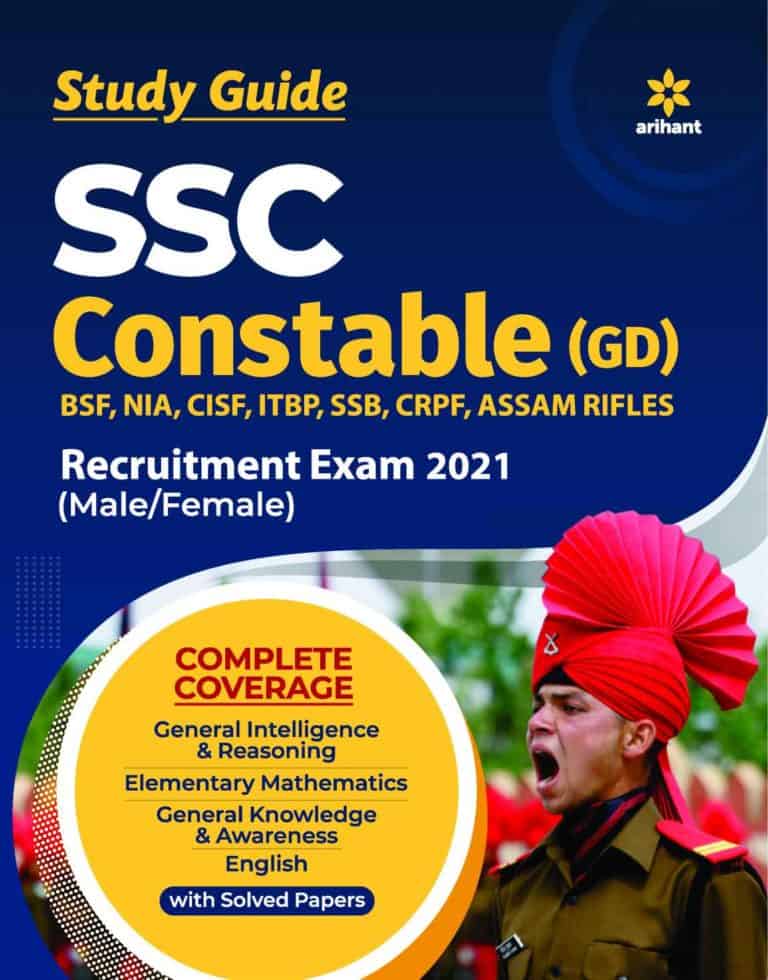
![BANK FINANCIAL MANAGEMENT [2023 Edition] - IIBF](https://www.pavithran.net/wp-content/uploads/2024/08/BANK-FINANCIAL-MANAGEMENT-2023-Edition-IIBF-768x1005.webp)
![Complete Guide for RRB Group D Level 1 Exam [4th Edition -2024] - Disha Experts](https://www.pavithran.net/wp-content/uploads/2025/03/Complete-Guide-for-RRB-Group-D-Level-1-Exam-4th-Edition-2024-Disha-Experts-785x1024.webp)